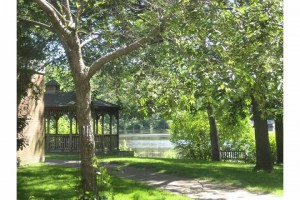To celebra te Image’s twenty-fifth anniversary we are posting a series of essays by people who have encountered our programs over the years. Read the earlier installments, Stumbling into the Waterfall, Henri Nouwen, Reaching Out, and The Notecards of Paradise.
te Image’s twenty-fifth anniversary we are posting a series of essays by people who have encountered our programs over the years. Read the earlier installments, Stumbling into the Waterfall, Henri Nouwen, Reaching Out, and The Notecards of Paradise.
I’m at lunch in a college cafeteria. At my table, the conversation goes like this:
“Have you heard John Tavener’s Protecting Veil?”
“Yeah, it’s like icon painting in music.”
“Icon writing, you mean.”
“When I listen to Tavener, I feel I could be immersed in George Wingate’s ethereal canvases—maybe his Earthhead.”
“Mmm, I saw his work in an issue of Image. I remember especially his Tree—it seemed to be breaking into the beyond.”
“For me it would be James Turrell’s amazing sky-spaces: the way he almost sculpts light. They give me the same feeling as Tavener’s music: of the divine mysteriously penetrating our world.”
“I wonder if there’s a novel that does that…”
“Well, this isn’t a novel, but Annie Dillard’s For the Time Being would be my call.”
I’m riveted by the creative energy of the conversation. But this isn’t at my college. It’s at one of the Glen Workshops I’ve attended over the years.
I get up to refill my teacup at the hot drinks counter and find myself talking about poetry with a man I’d scarcely met. “I’ve been reading Richard Wilbur,” he says. “How much do you think he lets his Christianity show through?” And there we are: balancing hot drinks and Wilbur’s subtle spirituality.
A few minutes later I’m sitting over tea and dessert with Mark Jarman, or maybe Jeanne Murray Walker, or Scott Cairns, or Ginger Geyer. Really, where else could you do this?
I can’t recall when I went to my first Glen Workshop. Maybe it was in the early 2000s. What I do definitely remember is the energizing delight of a totally new experience: some two hundred creative people together for a week of intense fellowship and fun.
Though mealtime conversations were an unexpected treat, every part of each day was positively zingy: Class in the morning, lectures or readings by faculty and guests in the afternoon, worship in the evening.
While I don’t remember what year I discovered the Glen (was it the year that Greg Wolfe announced a prize for the best answer to “So who is this ‘Glen’ person?”), I know I was there in 2006 and 2007. I’d been invited to coordinate Evening Worship for those weeks.
Each year the Glen has a theme; in 2006 it was “Love and Affliction: The Paradox of Suffering.” My task as worship coordinator was to work with the musicians and chaplain (in 2006 it was Eugene Peterson, who will be chaplain at this summer’s Glen East) to prepare worship services that developed the week’s theme.
Because this is worship by and for artists of all genres, I was supposed to include a poem for each evening. I loved choosing poems that fit the week’s theme, then choosing readers to proclaim them. We wanted congregational participation, so I set the poems responsively, with one person reading a stanza from the podium, then everyone responding with a line I’d picked out from the poem.
Here, for instance, is how we read Luci Shaw’s “In Reverse” (from her just-published book What the Light Was Like) in Thursday evening’s worship where Luci herself agreed to be the reader:
Reader:
Turn it all backwards. Turn time.
Unravel the half-knit sweater in
the knitting bag. Remove the spilled
wine from the rug, return the color of dark cream
to its fibers and take them back and back
to the sheep’s back before shearing.
All: Turn it all backwards. Turn time.
Reader:
I want my life over. To do it
the way that would give me who I want to be
now. To have again chances I didn’t take,
and take them.
All: I want my life over. / To have again chances I didn’t take, / and take them.
Reader:
Maker me innocent. Sluice me of
infractions. Give me soft
pink skin and a soul so fresh that
I may love my mother again.
All: Make me innocent. Sluice me of / infractions.
The Glen’s final night of Evening Worship, Saturday, traditionally included an Anointing Rite of Sending Forth, during which everyone came forward for an individual blessing. To accompany the rite that year, I asked Richard Osler to read a poem by Jorge de Lima called “Christian’s Poem,” after which Richard’s daughter Libby read Psalm 90.
I can still hear their meditative voices, reading as only people immersed in the art of faith—and the faith of art—could do.
I have no idea how the Glen Workshop really got its name (though I recall the audience laughing as Greg Wolfe read the award-winning invented origins). For me the simple dictionary meaning of a glen works well: a secluded valley. Not the valley of the shadow of death, though. Rather, a valley of the fullness of life, of camaraderie in the verdant pastures of the creative heart.
Note: Glen Workshop West has filled this year, but there are still spaces at Glen East. Learn more by clicking here.
Peggy Rosenthal is director of Poetry Retreats and writes widely on poetry as a spiritual resource. Her books include Praying through Poetry: Hope for Violent Times (Franciscan Media), and The Poets’ Jesus (Oxford). See Amazon for full list. She also teaches an online course, “Poetry as a Spiritual Practice,” through Image’s Glen Online program.











